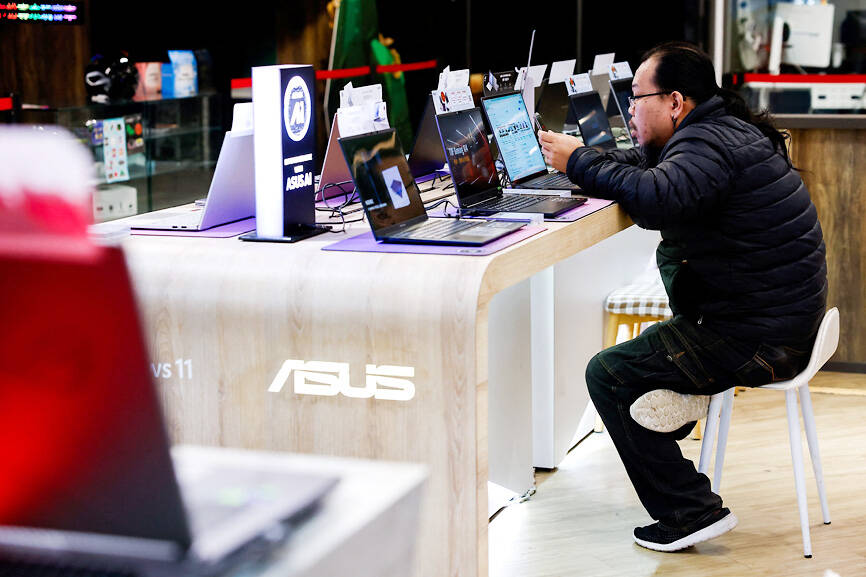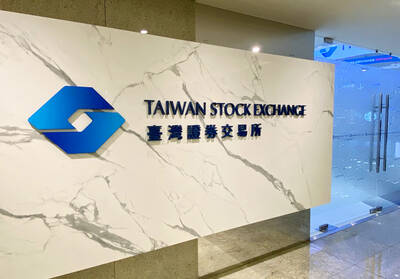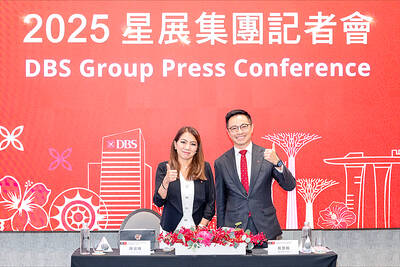PC vendor Asustek Computer Inc (華碩) yesterday reported a 23 percent sequential slump in net profit for last quarter, attributed to the effects of US tariff policies and exchange rate fluctuations.
Net profit dropped to NT$9.8 billion (US$327.1 million), compared with NT$12.79 billion in the previous quarter. On an annual basis, net profit decreased 17 percent.
Earnings per share decreased to NT$13.2, from NT$17.2 the previous quarter and NT$15.9 a year earlier.

Photo: Reuters
US tariff uncertainties shaved 0.5 percentage points off the company’s operating margin last quarter, as Asustek increased investment to improve supply chain resilience, Asustek chief financial officer Nick Wu (吳長榮) told an online earnings conference.
A sharp appreciation of the New Taiwan dollar since early May also eroded operating and gross margins in the second quarter by 1 to 2 percentage points, with the impact expected to persist into this quarter, Asustek cochief executive officer Jackie Hsu (許先越) said.
Gross margin last quarter was 12.4 percent, down 3.1 percentage points from the previous quarter and 5.9 percentage points from a year earlier, while operating margin plummeted to 3.4 percent from 8.5 percent the previous quarter and 7.8 percent in the second quarter last year.
The company expects the effects of the US tariffs and exchange rate fluctuations to ease significantly next quarter, and is confident that full-year operating margin would rebound to 4 to 5 percent, Hsu said.
The company is still uncertain about the US tariff rate on its main products, pending the outcome of a Section 232 investigation under the US Trade Expansion Act of 1962.
If rates and calculation methods make costs unbearable, the company would pass them on to consumers, pending negotiations with its suppliers and channels, Hsu said.
The US market contributed a low to mid-teens percentage of Asustek’s revenue last quarter, compared with 55 percent from Asia and 23 percent from Europe.
The company has shifted 90 percent of its motherboard and PC production to Thailand, Vietnam and Indonesia, and launched a US server assembly line in the fourth quarter last year, Asustek cochief executive officer Samson Hu (胡書賓) said.
Server sales made up more than 15 percent of revenue last quarter, meeting its guidance and fueled by shipments of artificial intelligence (AI) servers powered by Nvidia Corp’s GB200 chips, Hu said.
Asustek expects PC revenue this quarter to grow 5 to 10 percent from last quarter, while its components revenue, primarily from motherboards and servers, is expected to remain flat.
AI PCs accounted for about 10 percent of its total PC revenue last quarter, or about 20 percent when excluding gaming PCs, the company said.
Shipments of advanced gaming products, including handheld Xbox devices, are expected to continue driving growth in the second half, Hsu said.
Overall, revenue in the second half is expected to account for 45 to 48 percent of the total for the year, with the first half contributing 52 to 55 percent, he added.

Taiwan Semiconductor Manufacturing Co (TSMC, 台積電) secured a record 70.2 percent share of the global foundry business in the second quarter, up from 67.6 percent the previous quarter, and continued widening its lead over second-placed Samsung Electronics Co, TrendForce Corp (集邦科技) said on Monday. TSMC posted US$30.24 billion in sales in the April-to-June period, up 18.5 percent from the previous quarter, driven by major smartphone customers entering their ramp-up cycle and robust demand for artificial intelligence chips, laptops and PCs, which boosted wafer shipments and average selling prices, TrendForce said in a report. Samsung’s sales also grew in the second quarter, up

LIMITED IMPACT: Investor confidence was likely sustained by its relatively small exposure to the Chinese market, as only less advanced chips are made in Nanjing Taiwan Semiconductor Manufacturing Co (TSMC, 台積電) saw its stock price close steady yesterday in a sign that the loss of the validated end user (VEU) status for its Nanjing, China, fab should have a mild impact on the world’s biggest contract chipmaker financially and technologically. Media reports about the waiver loss sent TSMC down 1.29 percent during the early trading session yesterday, but the stock soon regained strength and ended at NT$1,160, unchanged from Tuesday. Investors’ confidence in TSMC was likely built on its relatively small exposure to the Chinese market, as Chinese customers contributed about 9 percent to TSMC’s revenue last

Taiwan and Japan will kick off a series of cross border listings of exchange-traded funds (ETFs) this month, a milestone for the internationalization of the local ETF market, the Taiwan Stock Exchange (TWSE) said Wednesday. In a statement, the TWSE said the cross border ETF listings between Taiwan and Japan are expected to boost the local capital market’s visibility internationally and serve as a key for Taiwan becoming an asset management hub in the region. An ETF, a pooled investment security that is traded like an individual stock, can be tracked from the price of a single stock to a large and

Despite global geopolitical uncertainties and macroeconomic volatility, DBS Bank Taiwan (星展台灣) yesterday reported that its first-half revenue rose 10 percent year-on-year to a record NT$16.5 billion (US$537.8 million), while net profit surged 65 percent to an unprecedented NT$4.4 billion. The nation’s largest foreign bank made the announcement on the second anniversary of its integration with Citibank Taiwan Ltd’s (花旗台灣) consumer banking business. “Taiwan is a key market for DBS. Over the years, we have consistently demonstrated our commitment to deepening our presence in Taiwan, not only via continued investment to support franchise growth, but also through a series of bolt-on acquisitions,” DBS